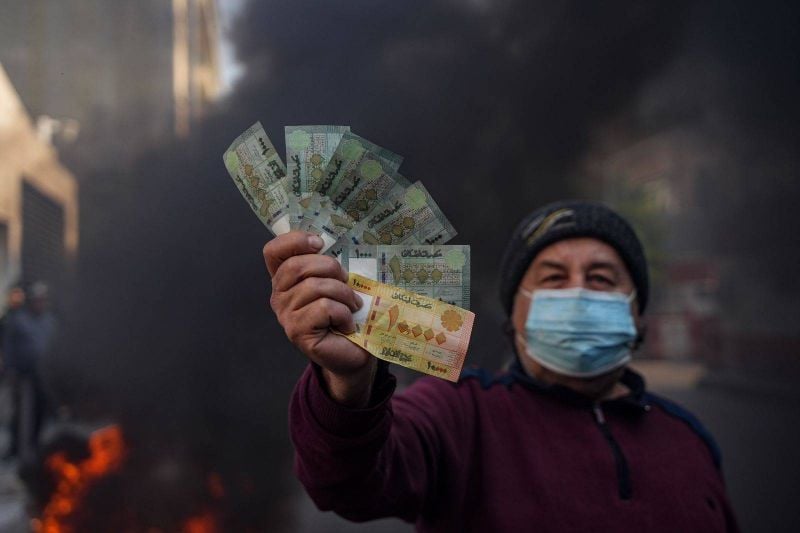
An angry Lebanese depositor during Thursday's bank burning in Beirut's Badaro neioghborhood. (Credit: Mohammad Yassine/L'Orient Today)
Since Friday, statements condemning or supporting Thursday's violence against banks in Beirut's Badaro neighborhood have come from all directions.
Except for Banque du Liban, which (for once) did not flinch.
The Association of Banks in Lebanon (ABL) told angry depositors in a sharp statement Friday evening that “attacking banks is useless, your funds are not there.”
On Thursday, angry Lebanese, led by the activist group The Depositors' Cry, set fire to branches of Fransabank, Bank Audi, Creditbank, Byblos Bank, BBAC, and Banque Libano-Française in Badaro.
Members of the same group held a sit-in in Horsh Tabet, a suburb of Beirut, outside the home of ABL head Selim Sfeir.
ABL took the opportunity to remind depositors that “the time has come for you to recognize who has wasted your funds and put pressure on the right stakeholders to get them back” — a dig at Banque du Liban (BDL) Governor Riad Salameh.
The association also warned that the acts of vandalism committed against banks will only “harm" depositors because such attacks would “deprive depositors of ATMs,” which remain the only operational banking service since the banks' began their open strike last Tuesday.
ABL also argued that violence and destruction would incur repair costs, which would translate to increased banking fees and would undermine the banks' ability to return withheld deposits.
This ludicrously suggests that, while the depositors' funds are not in the banks, per the ABL statement, they could nevertheless be used to repair damaged bank branches.
On Sunday, rumors about the banks reopening spread following informal negotiations to drop the charges filed against the banks by Mount Lebanon Public Prosecutor Ghada Aoun.
In response, ABL issued a new statement denying the “unfounded” rumors.
BLOM Bank also issued a statement over the weekend, denying reports of alleged “cooperation” with Aoun and stressing that it only handed over requested documents to the prosecutor — a measure that was approved by the bank's board. The statement said the bank “has nothing to hide.”
Last Wednesday, “The People Want Reforms,” a group that has been leading complaints against banks and some of their officials since 2021, claimed that the BLOM Bank and Credit Bank “have shown a willingness to comply with the decision to lift the banking secrecy, contrary to the ABL's guidelines.”
A group of 'thieves'
Despite the banks' and ABL's position, the Depositors' Cry reaffirmed its willingness to fight for the rights of Lebanese depositors in a Saturday statement.
The events in Badaro “will be repeated” and will only escalate, the group warned.
Responding to ABL, the group recalled that Lebanese depositors “entrusted their money to banks and not to a third party.” They warned ABL that “all banks and their owners will be targeted.”
The group ended their statement by labeling the banking sector as “thieves.”
“Our Money is Ours,” a group that split for the Depositors' Cry in 2021, supported Thursday's actions against Bank, saying that the bank burnings were mere “rehearsals.”
The group did not thin its words against ABL, accusing it of being “an association of thieves,” and a “bunch of criminal loan sharks sowing chaos.”
Following a Central Security Council meeting on Friday, caretaker Prime Minister Najib Mikati wondered “if depositors were really behind the attacks on banks on Thursday,” or if the bank burnings were “on the orders of some other parties.”
The first added the cabinet would agree this week “in order to take the [necessary] measures required by BDL,” without offering further details
Mikati continues to defend BDL's governor, who is being prosecuted for corruption charges on local and international investigations and is despised by a large segment of the Lebanese population.
Finally, the Lebanese Economic Organizations, chaired by former minister Mohammad Choucair, also added their thoughts on Saturday, issuing a statement denouncing “the ferocious attack against the banking sector,” and calling for “everyone to assume responsibility” in order to “preserve” what remains of the sector.
The economic organizations, made up mainly of large depositors, indicated that the solution lies in a financial and economic recovery plan.
The plan must acknowledge the responsibility of banks, BDL, and the government in Lebanon's ongoing economic crisis, and aim to return funds to depositors.
This article was originally published in French in L'Orient-Le Jour. Translation by Sahar Ghoussoub.